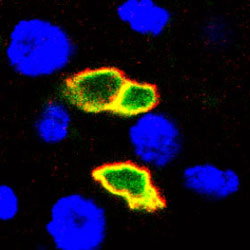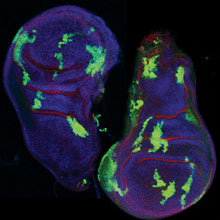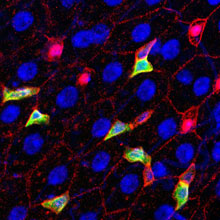
Intestinal cells labeled for
a stem cell-specific
membrane protein (red).
Stem cell division is essential for tissue maintenance and repair. However, inhibiting their proliferation, when new cells are not needed, is also essential prevent stem cell exhaustion and tumor formation. While a lot of research effort has been focused on the mechanisms that allow stem cell to proliferate, much less is known about the mechanisms that dynamically regulate stem cell quiescence (re)entry. We are currently investigating the role of post-transcriptional regulation of gene expression in the control of quiescence.
Using a genome wide-approach, we identified a factor that control RNA stability as an essential regulator of stem cell quiescence in the fly intestine. This RNA binding protein is required for the re-entry of stem cells in a quiescent state after their activation during tissue repair. Loss of this regulation leads to uncontrolled stem cell proliferation and poor survival. Interestingly, members of this protein family have been implicated in cancer in mice and humans, suggesting that strong similitudes exist between the mechanisms that control stem cell proliferation in Drosophila and cancer cell proliferation.
We are now investigating the molecular targets and the signaling pathways that control the activity of this post-transcriptional gene expression regulatory mechanism. Collaborations with the Center for RNA Biology at the University of Rochester provide the necessary expertise and are key to this research project success.

Clonal analysis in developing
larval wing imaginal
discs in Drosophila

Architecture of the Drosophila
intestinal epithelium